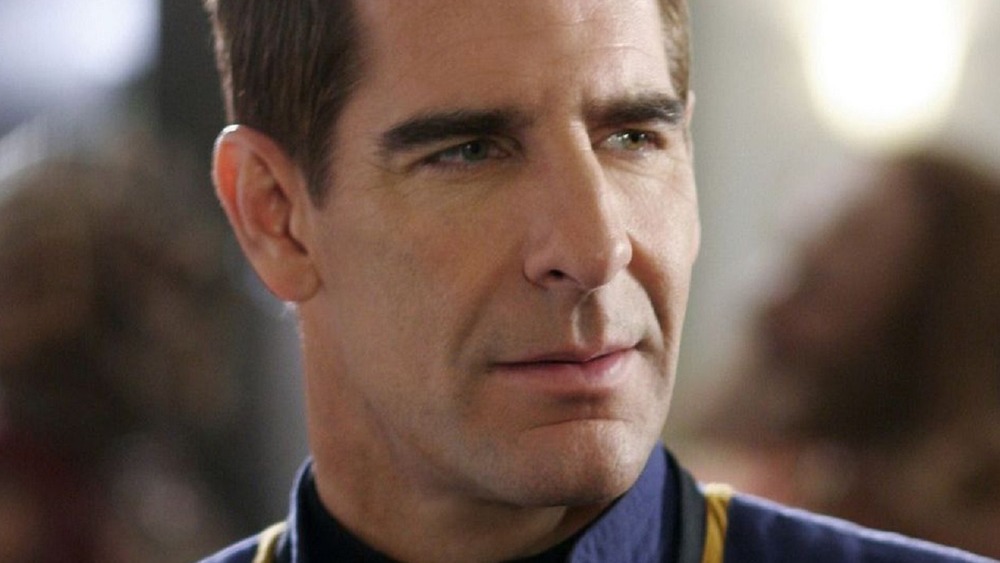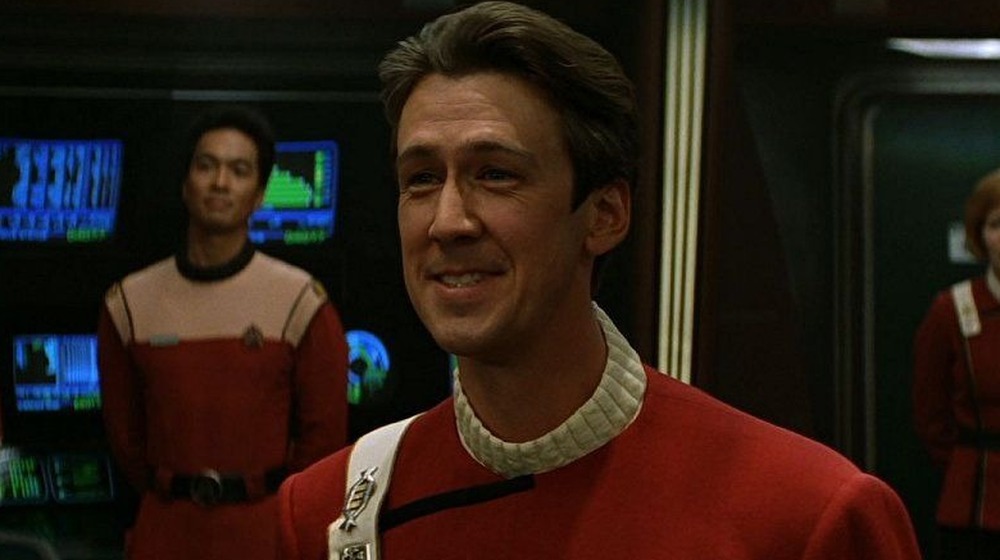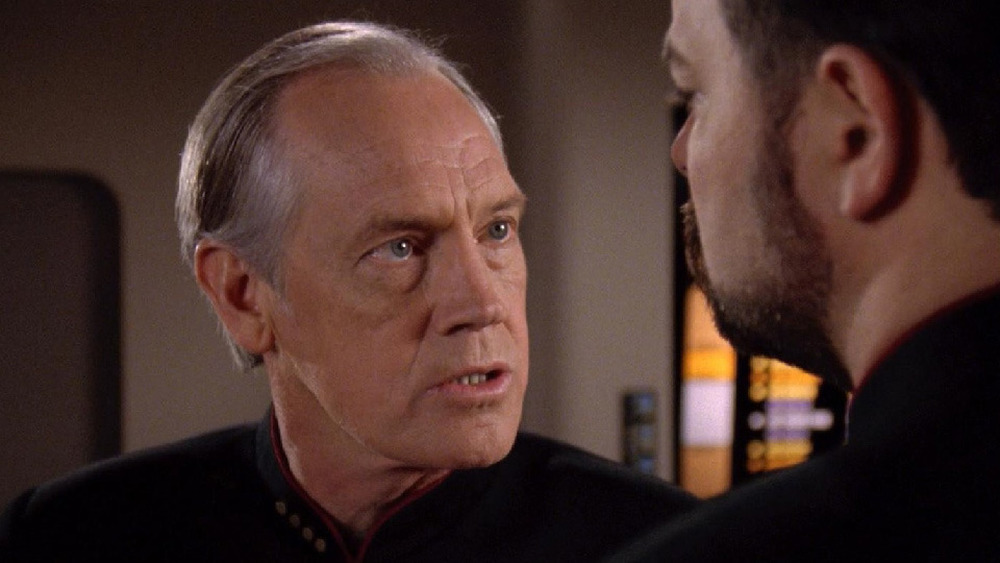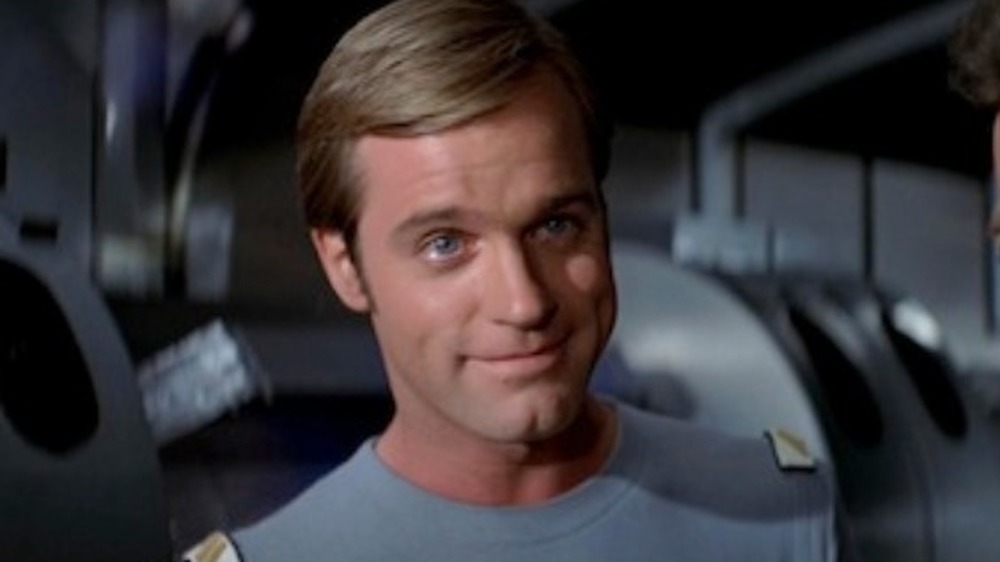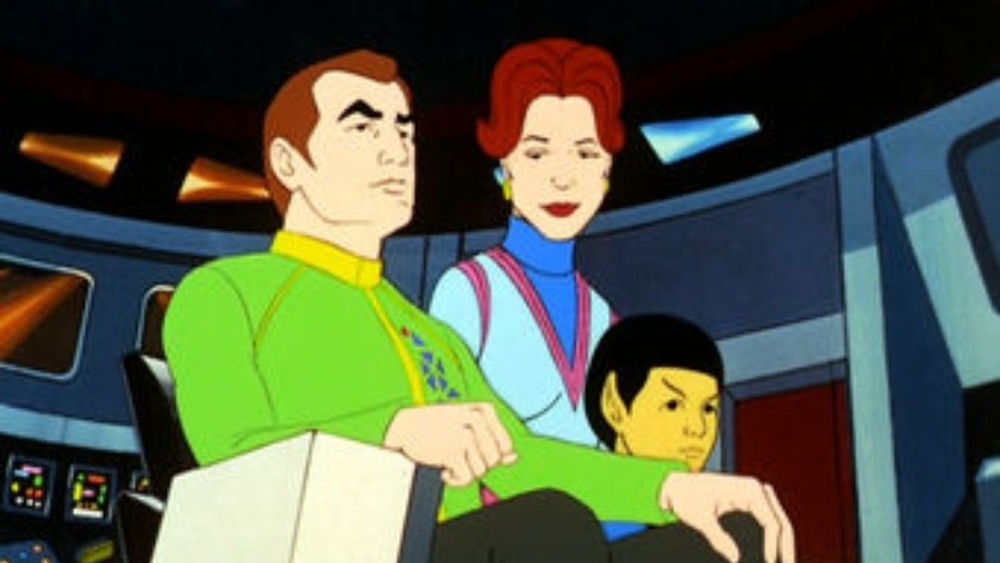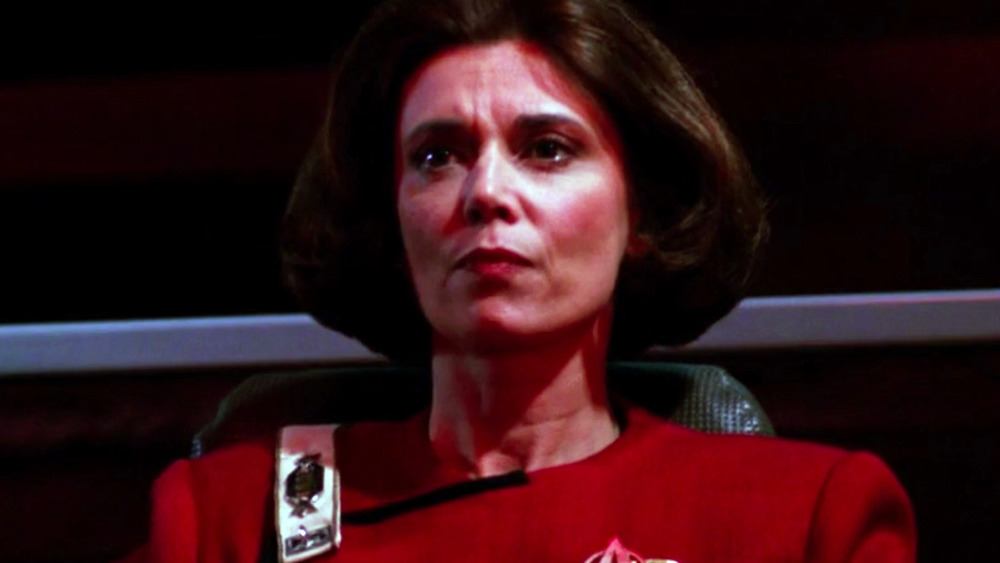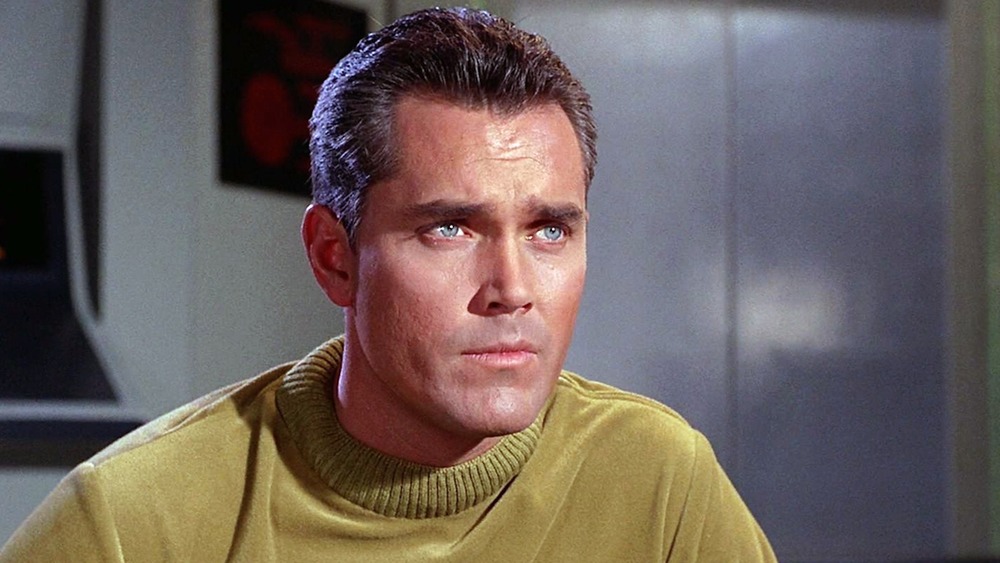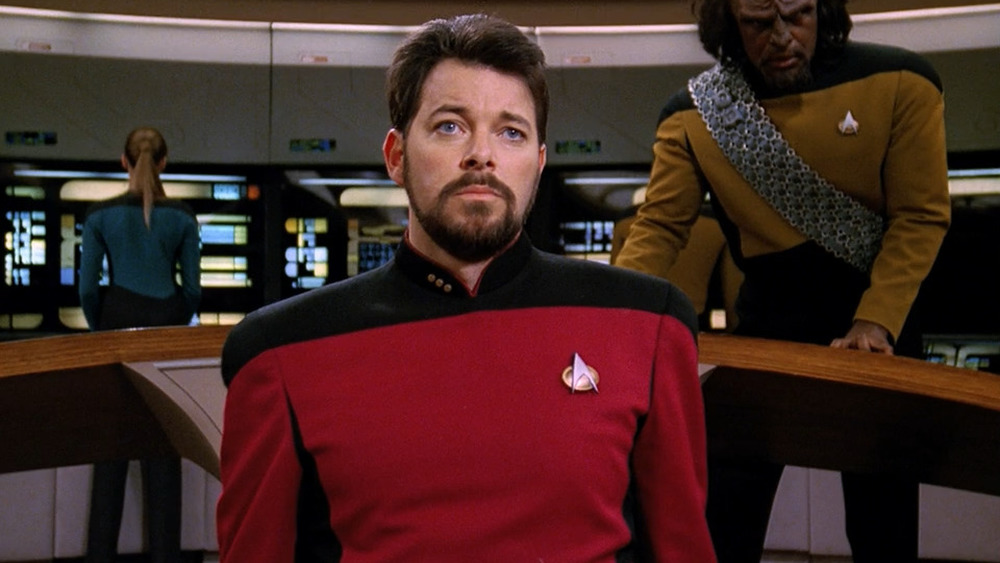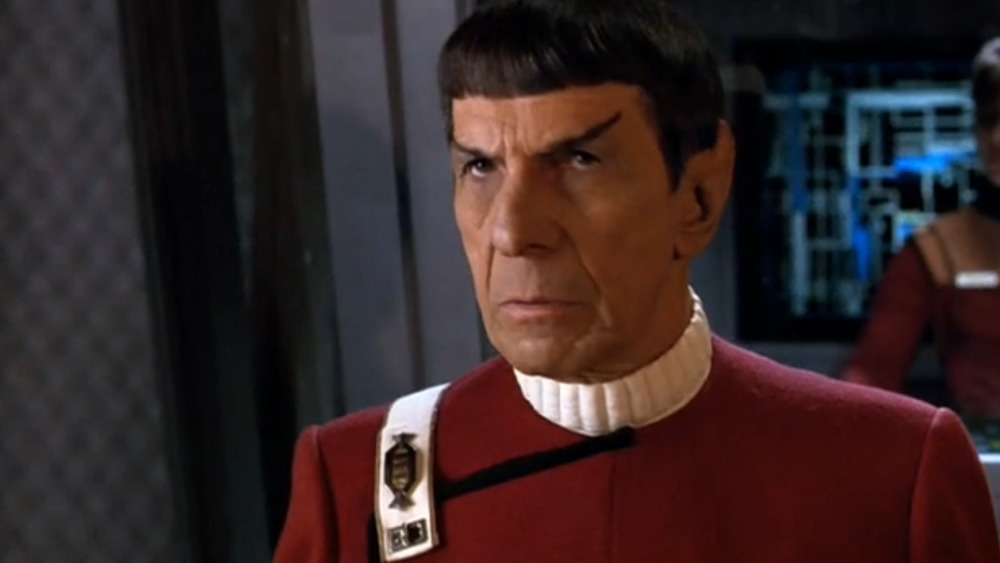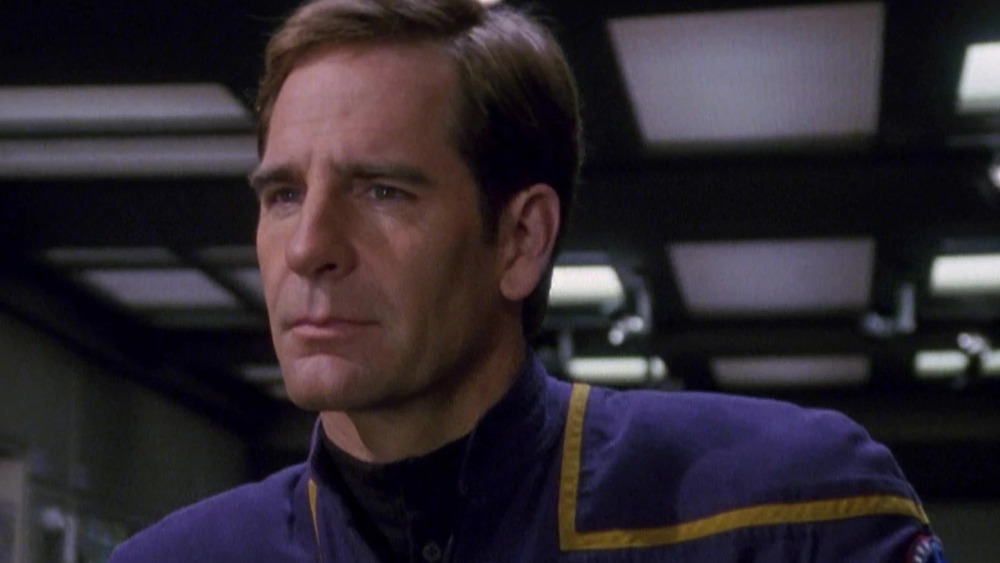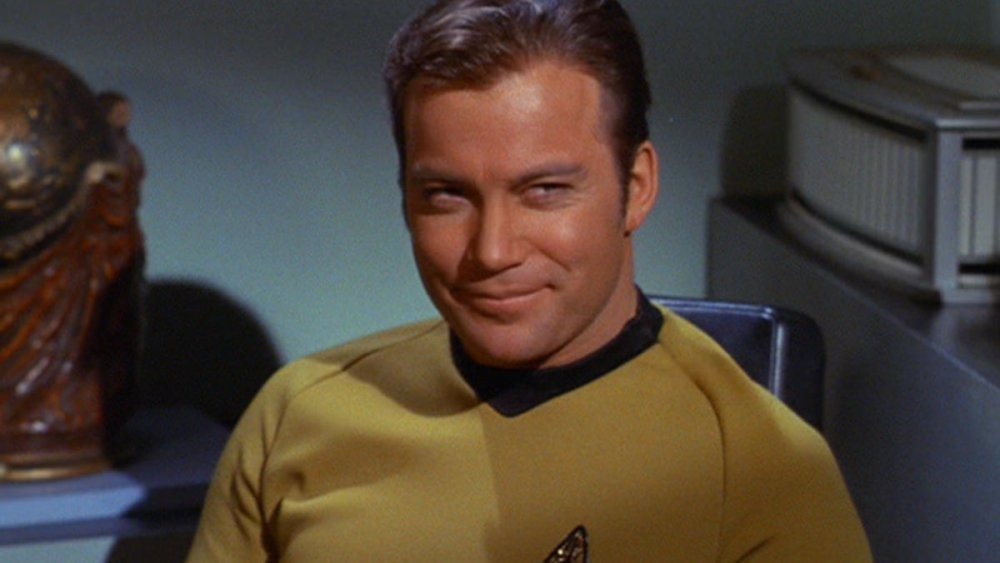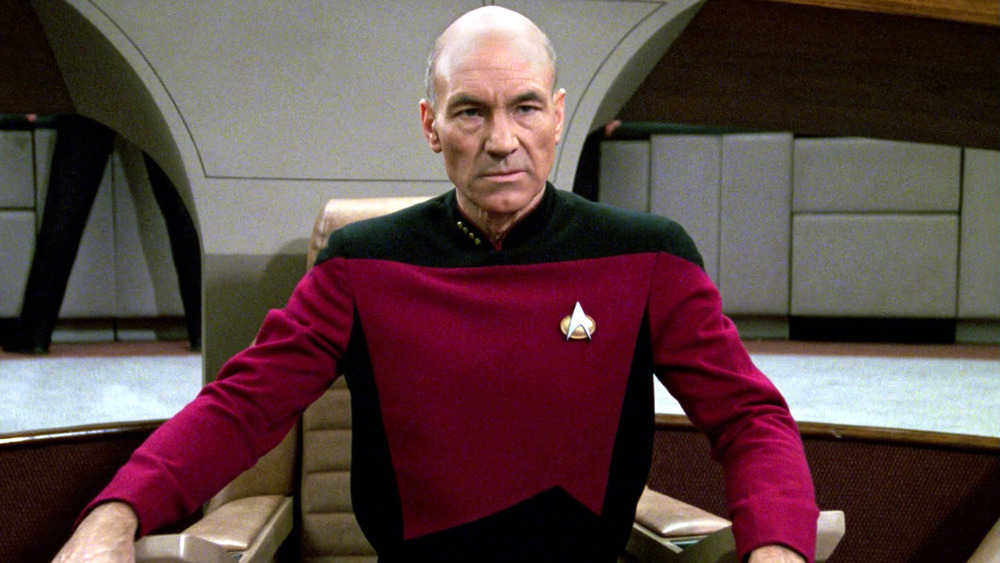Star Trek's Enterprise Captains, Ranked From Worst To Best
With over a dozen movies and a growing number of television series, the Star Trek franchise boasts an impressive list of captains. And we're pretty confident that there isn't a single captain that at least one Trek fan doesn't call their favorite. After all, there are plenty of debates about whether Picard is better than Kirk, whether Janeway is better than Sisko, and so on and so forth. It's all subjective, and for the most part, it's all in good fun.
But with so many captains now a part of the Trek universe, we thought we'd narrow in on a more specific question. Who are the best and worst captains of the many ships with the name of the vessel that started it all, the Enterprise? After all, we've been introduced to quite a few of them over the years, even beyond the more recognizable leads of Kirk, Picard, and Archer.
In order to answer this question, we're sticking to Enterprise captains of the Prime Star Trek timeline. That's not meant as disrespect to fans of the Kelvin timeline, but if we consider those captains, then we open it up to all the other alternate timeline Enterprise captains, like those from the Mirror Universe, from non-canonical media, and even that shaggy-bearded Will Riker from the Borg-ruled timeline in The Next Generation's (TNG) "Parallels." And since we don't have as much bandwidth as your average Starfleet supercomputer, we've got to make tough choices.
John Harriman isn't ready for the challenge
In the opening scene of 1994's Star Trek: Generations, we meet the bottom captain on our list — Captain John Harriman (Alan Ruck) of the Enterprise-B. The ship's maiden voyage is meant as little more than an opportunity to show off for the press, and to celebrate the occasion, James Kirk (William Shatner) and some of his retired officers are welcomed aboard as honored guests. Harriman only has a quick trip around Earth's solar system planned, but things get more complicated when they pick up a distress call from ships caught in a severe gravimetric distortion.
Initially, Harriman tries to get another ship to answer the call, giving the excuse that this new Enterprise lacks the crew and the outfitting. Pressured by the presence of the legendary Kirk and by the press, Harriman decides to get involved. Once arriving at the distortion causing all the trouble, Harriman is hesitant to get too close. Eventually, he swallows his pride and asks Kirk for his suggestions.
Now, we need to be fair to Harriman. Ultimately, he rises to the occasion, and it seems likely the experience will make him a better captain. Also, canonically speaking, this is the only scene in which we get the chance to judge him. Still, even with these considerations, it's impossible to imagine some of the more well-known Enterprise captains acting quite so skittish or indecisive, even during their first time in the big chair.
Edward Jellico is too narrow-minded to captain the Enterprise
Ronny Cox has the distinction of not only appearing on one of Star Trek: The Next Generation's most beloved two-parters — season 6's "Chain of Command" — but of playing one of the franchise's most hated captains. Captain Edward Jellico transfers from the USS Cairo to the Enterprise in order to replace Jean-Luc Picard (Sir Patrick Stewart) indefinitely. The change is made so Jellico can conduct negotiations with the Cardassians while Picard is sent on what some believe is a suicide mission.
A lot of the fan hatred for Jellico can be boiled down to the fact that he's the new guy. For example, two moments that irk fans are when he orders Livingston, Picard's pet fish, removed from the Ready Room and when he insists Deanna Troi (Marina Sirtis) start wearing her uniform on the bridge. While, yes, these are big changes, they aren't unreasonable ones. Honestly, it makes you wonder why Troi has gotten a pass as far as uniforms are concerned all this time.
Where Jellico really does deserve some of the fan rejection is his unwillingness to listen to his officers, particularly when it comes to Will Riker (Jonathan Frakes). It's part of the first officer's job to discreetly express any concerns to the captain about their orders. But Jellico treats any questioning from Riker like a full-blown mutiny. Thankfully, Picard survives his mission and resumes command of the Enterprise.
Will Decker is a good man who doesn't get much of a chance
Will Decker (Stephen Collins) gets a raw deal in 1979's Star Trek: The Motion Picture. After James Kirk completes his five-year mission, he recommends Decker to be his successor as captain of the Enterprise. But Decker doesn't get very long to enjoy his promotion. Instead, he oversees the refit of the Enterprise, only to have his rank abruptly taken away from him.
In the beginning of the film, Kirk — now an admiral — gets himself back in the Enterprise's chair when a powerful space-borne "intruder" is detected heading toward Earth. While it's clear that there's some validity to Kirk's experience making him the best choice for this particular job, it's just as obvious that he's unhappy behind a desk and is using the situation as an opportunity to get himself back in the thick of things.
While we never get to see much of Decker as a captain, he takes his demotion just about as well as anyone could. He still serves aboard the ship and even saves it a couple of times during the journey to intercept the intruder, which eventually turns out to be an evolved Voyager probe originally sent from Earth in the 20th century. Decker volunteers to become one with the intruder — which calls itself V'ger. Clearly heroic and willing to sacrifice himself for the greater good, Decker would probably have a higher spot on this list if he'd had more time in the captain's chair.
Robert April deserves his accolades
Perhaps one of the lesser-known Enterprise captains is Robert April (voiced by James Doohan), who precedes both Kirk and Christopher Pike as captain of the Enterprise. He only has one canonical appearance — in the Star Trek: The Animated Series season 2 episode "The Counter-Clock Incident" – and it's set long after most of his Enterprise missions. Regardless, the story gives us a good idea of what kind of captain April must've been.
In "The Counter-Clock Incident," April and his wife, Sarah, are in their 70s and aboard the Kirk-commanded Enterprise as passengers on their way to the planet Babel, where April is meant to be honored on the occasion of his mandatory retirement. On the way there, the ship is caught in a negative universe, and in order to escape, the ship needs to travel to a dead star ... which causes everyone on the ship to age backwards. Eventually the entire regular crew is so young that completing or even understanding their tasks aboard the Enterprise is impossible. It's only because of the younger but still adult April and his wife that the Enterprise escapes the negative universe intact.
April's relatively low spot on our list is mainly because we don't get much time to see him. Considering it's said he's one of the most decorated officers in Starfleet, he'd probably rate a higher spot if we had the chance to watch his canonical adventures.
Rachel Garrett gives everything for the Federation
In the season 3 TNG episode "Yesterday's Enterprise," we meet the only woman to be appointed captain of the Enterprise who's been revealed thus far. Tricia O'Neil plays Rachel Garrett, captain of the Enterprise-C, who finds herself and her ship transported to a bleak future. Responding to a distress call from a Klingon outpost, Captain Garrett faces off against four Romulan warbirds. The exchange of fire causes a temporal rift, sending the Enterprise-C over 20 years into the future, where Starfleet is fighting a losing war against the Klingon Empire.
While we only get this one episode to see Garrett's leadership, it doesn't take long before her quality as a captain is obvious. While she's just as shocked as anyone would be about being hurled decades into the future, she doesn't let it interfere with her duty. She immediately sets to repairing the Enterprise-C to help with the war effort, including refusing Dr. Crusher's (Gates McFadden) insistence that she rest in Enterprise-D's sick bay.
Once Captain Picard makes it clear the best way Garrett can help is to return to her time — something that will almost certainly mean the death of her and her crew, considering the Romulan firepower waiting for them — she accepts her fate and that of her ship. Unfortunately, Garrett doesn't make it back to the past. She's killed during a Klingon attack, forcing her first officer to step in.
Christopher Pike is one of the Enterprise's best
Captain Christopher Pike has been played by more actors on TV than any other Enterprise captain. The first actor to play him was Jeffrey Hunter in the Star Trek: The Original Series pilot episode, "The Cage," and in flashbacks in the two-parter "The Menagerie." Sean Kenney plays the chair-bound version of Pike in "The Menagerie," and Anson Mount plays him in the second season of Star Trek: Discovery.
Ironically, in spite of so many actors playing him, we actually haven't seen him as an Enterprise captain much. There's his time as captain in "The Cage," but for most of Discovery's second season, he's captaining the titular ship rather than the Enterprise. However, he does return to the Enterprise in Discovery's two-part season 2 finale, and he'll reportedly reprise the role in the upcoming Star Trek: Strange New Worlds.
However, we still have a good idea of what kind of Enterprise captain Pike was. He performs just as well or better than most captains in "The Cage," and while it may not be the Enterprise he's captaining for most of his time on Discovery, it's a good bet he's just as solid and courageous in the face of danger and mind-bending discoveries on the bridge of the Enterprise. Not to mention that — as is revealed in "The Menagerie" — we know the crippling injuries he eventually suffers are the result of Pike sacrificing his own safety to save a ship full of Starfleet cadets.
Will Riker defeats the Federation's worst enemy
There are plenty of moments in both the TNG TV series and the TNG era of films in which Will Riker takes over the bridge from Captain Picard. For example, Riker is in charge during the battle that ultimately destroys the Enterprise-D in Star Trek: Generations, and he also takes command when the Enterprise-E races to warn the Federation of the villains' plans in 1998's Star Trek: Insurrection. But no single story more clearly proves Riker's worth as an Enterprise captain than the events of one of the best TNG two-parters, "The Best of Both Worlds," which bridges the series' third and fourth seasons.
Ironically, Riker is wrestling with why he keeps turning down promotions when one is thrust upon him. When Captain Picard is kidnapped by the Borg and assimilated into their collective, Riker is given a field promotion to captain and names Commander Shelby (Elizabeth Dennehy) as his first officer. In spite of the assimilated Picard — now calling himself "Locutus of Borg" — having intimate knowledge of Riker's personality and tactics, Riker manages to outmaneuver the Borg, catch them off balance, and save both Picard and the Federation from assimilation.
"The Best of Both Worlds" makes it clear that — while no one would want to see Picard taken away from the Enterprise – Riker could've taken his mentor's place permanently, if necessary.
Spock becomes a better captain over time
Along with multiple instances of Spock (Leonard Nimoy) taking charge of the Enterprise in Star Trek: The Original Series, he takes the reins completely a couple of times in the films. Spock is the captain of an Enterprise mostly full of trainees between the events of Star Trek: The Motion Picture and 1982's Star Trek II: The Wrath of Khan. He also takes command in 1991's Star Trek VI: The Undiscovered Country after Captain Kirk and Dr. McCoy (DeForest Kelley) are arrested by the Klingons.
We don't get to see much of Spock as a captain in between the first two Trek movies, but the fact that his trainees manage to help the Enterprise survive what proves to be one of their deadliest duels in Wrath of Khan is evidence of his worth as a teacher. And it's difficult to imagine anyone else being able to prove Kirk and McCoy's innocence as Spock does in Star Trek VI.
If it weren't for Spock's evolution as a character, he might find himself a bit lower on our list. In early commands Spock enjoys during the original series — such as his time trying to save his shuttle crew in "The Galileo Seven" — Spock's overreliance on logic makes it difficult for him to serve as an effective leader. But by Star Trek VI, he's learned, as he tells Kim Cattrall's Lt. Valeris, that "logic is the beginning of wisdom" and "not the end."
Jonathan Archer was a trailblazer
By the time Star Trek: Enterprise started showing us the adventures of Jonathan Archer (Scott Bakula), there had been five other Star Trek series and nine movies, all taking place chronologically after the events of Enterprise. So most fans watching Enterprise for the first time had already seen the experiences of captains like Kirk, Picard, Janeway, etc., and as such, some of the decisions Archer makes can seem insane.
For example, take the episode "Strange New World." When T'Pol (Jolene Blalock) warns caution before sending crew members to explore a planet that no human has set foot on before, Archer and some of the other bridge officers laugh at her concerns. When you see something like that, it's tough to ignore about a million and a half situations in Star Trek that would make Archer want to punch himself for laughing.
In light of this, Archer sometimes comes off as less than his future counterparts, but you have to remember that while the idea of going where "no one has gone before" is often (but not always) hyperbole in the case of future captains, it's much more literal in Archer's case. Until the very end of Enterprise, the United Federation of Planets doesn't even exist. Archer makes long lists of mistakes, but he does it because he goes down paths no other human has trod before. And like the best captains of Trek, he does it with passion and stubborn idealism.
James T. Kirk is the Enterprise captain all others are judged against
For those more used to later captains like Picard and Janeway, James T. Kirk makes some decisions that are mind-boggling. For example, while later captains would take great pains to protect the integrity of the timeline, when Kirk beams a 20th-century fighter pilot aboard the Enterprise in "Tomorrow is Yesterday," you practically expect him to give the guy a tour of the ship. And you would rarely expect the kind of vengeance in other captains that you see in Kirk as he pursues the Gorn in "Arena." And no Starfleet captain makes quite as many mistakes due to the "feminine wiles" of antagonists as Kirk does.
But then, there are the great moments in Trek that no other captain could've achieved. Kirk makes it possible for peace to be made with the Klingons in Star Trek VI, which has far-reaching consequences in the franchise's continuing narrative. Plus, he stops the Romulans from seeing the Federation as easy prey and gives them a couple bloody noses in the meantime.
At heart, Kirk is more of a pure adventurer than just about any other captain in the franchise, but he doesn't shirk his duty. And sometimes, his less civilized side makes him a better captain. Whether you like him or not, you have to admit that when he tells Picard in Generations, "I was out saving the galaxy when your grandfather was in diapers," there isn't a single lie in his mouth.
Jean-Luc Picard is the best the Enterprise has ever known
Probably no two Star Trek captains are weighed against each other more often than Kirk and Picard. Picard is often treated as a more timid, snootier answer to his predecessor, but those comparisons aren't fair. Yes, Picard certainly is older than Kirk was when he took over the Enterprise, and his overall affect feels more intellectual. But when you actually consider his actions, Picard is no diplomatic shadow of Kirk.
Sure, he's not quite as brash, but that doesn't stop him from going against Starfleet's orders when he feels it's necessary, like when he ignores their insistence that he stay out of the fight with the Borg in First Contact or when he disobeys Admiral Dougherty's (Anthony Zerbe) orders in Insurrection. He's just as passionate about meeting the unknown as Kirk, but that passion is tempered with experience. While he's often portrayed as being more academic, that isn't a weakness. It's in part Picard's education that makes him the only captain who could defend Data as well as he does in "The Measure of a Man" — or, for that matter, himself in "The Drumhead." And it also helps him to keep saying no when more quick-tempered crew members like Worf want to arm photon torpedoes every time they meet someone new.
Overall, no other Enterprise captain has matched the perfect balance of sophistication, intellect, passion, and unmovable idealism as Sir Patrick Stewart's portrayal of Captain Jean-Luc Picard. That's why there can be no other choice for the top spot of Star Trek's Enterprise captains.
